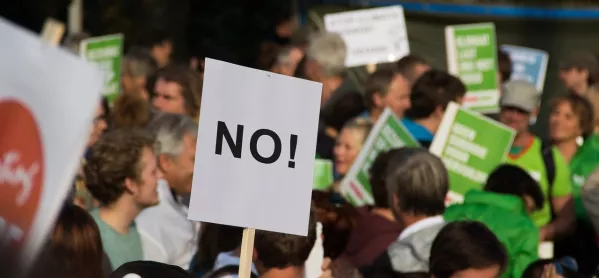- Home
- ‘The climate strikes threaten the safety of our pupils’
‘The climate strikes threaten the safety of our pupils’

In the world of education there are things you can plan for and things you can’t. There’s the timetabling, the budgeting, the lesson planning, reports to governors and various other examples we might define as "routine but important". These are the things under our control.
And then, as erstwhile prime minister Harold Macmillan taught us many years ago, there are the things that are not. “Events, dear boy, events,” as he put it.
Things that simply happen, Macmillan was suggesting, were what ultimately caught you out – however extensive, detailed, forensically assured you might think your planning is, events will swoop in, wrong-foot us, unnerve us.
In particular, we stand in loco parentis – responsible for a child while the parents are absent. And the first responsibility of any school or college leadership team – before they get to a child’s learning or development – is their safety. We have a duty of care.
And that’s why – unfashionable as it makes me – I believe a planned walkout by students in many towns and cities on Friday to join protests over climate change is misconceived.
It is one of the reasons that ASCL has made a strong public statement over this issue when we have been asked for our views. Here is what we have said:
“While we understand the strength of feeling over the very important issue of climate change, we would urge pupils against walking out of school on Friday. It is extremely disruptive for a school to have to deal with unauthorised absences and pupils will be missing out on important learning time.”
As a fledgling headteacher I faced a similar situation in 2003 when there was a national campaign for students to walk out of school in protest at the Iraq War. Our pastoral staff – heads of year – picked up rumours that large numbers of students were intending that week to leave the school site to join a demonstration in town.
So, in a letter to parents, in assemblies for students, in briefings with staff, I explained why we couldn’t possibly condone this act of truancy. I tried to explain the principles behind the decision – that this wasn’t about whether I or the governors did or didn’t support the cause. It was about us being responsible for the safety and wellbeing of every young person.
As is often the case, I heard from people who agreed and people who didn’t – students, staff and parents. One parent in particular came into school after the protest, entered my office and berated me for not supporting his daughter when she chose to leave the school site.
He resented, he said, the unauthorised absence now added to his daughter’s previously unblemished attendance record, and the letter I’d sent lamenting her defiance of staff by leaving the site.
This student happened to be one of the top members of my debating society – an eloquent and politically savvy young person who went on to do brilliantly at university. “How can you possibly encourage students to enjoy debating political issues and then punish them for putting their views into action?” said her father.
But to me, that was irrelevant. It’s where leaders’ responsibility for the safety of young people had to take precedence over any sympathy or otherwise for their passion and their cause.
We could have chosen to make this an exceptional circumstance and to authorise the absence from school. That was and is now within the right of leaders.
But I knew then that if you start authorising cause A rather than cause B, you run into trouble. We really can’t get into making value judgements on such issues.
I know there are other views. People have been telling me so on social media and in emails. So why is it acceptable for headteachers to march in London if it’s not all right for young people? Aren’t double standards at play? How come schools close because of snow and don’t lament the lost time? What does one day of a child’s education matter in comparison to a looming global disaster? What have I personally done to prevent climate change?
So, I know there will be many who disagree, who believe that school leaders should sanction a protest by young people because the cause is an important one and in doing so, perhaps, we encourage their rightful passion to improve the world. That, in fact, may be the judgement of some leaders this week, and they will have taken a thoughtful and considered approach on how to best manage the situation.
But, again let’s not conflate the issues.
The central matter here isn’t climate change or freedom of expression or political education. It is pupils’ safety. School leaders are responsible for the young people on their roll. And schools are placed in a very difficult position if those young people aren’t on our site, aren’t supervised, and cannot be safely accounted for, whatever the cause.
Geoff Barton is the general secretary of the Association of School and College Leaders
Keep reading for just £1 per month
You've reached your limit of free articles this month. Subscribe for £1 per month for three months and get:
- Unlimited access to all Tes magazine content
- Exclusive subscriber-only stories
- Award-winning email newsletters



